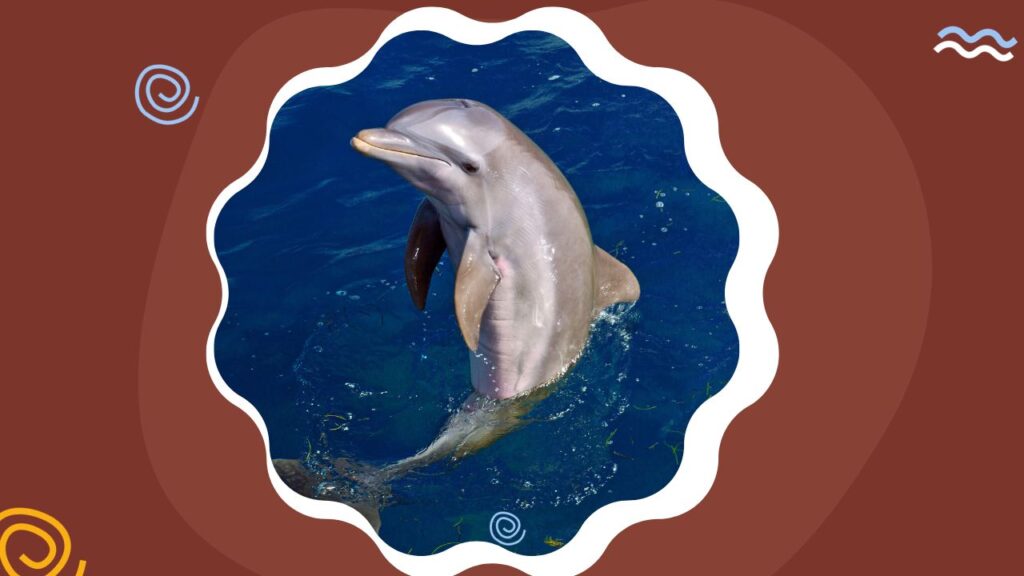
Dolphins have always been fascinating creatures, captivating humans with their intelligence and playful nature.
However, one burning question often arises when it comes to these enchanting marine mammals – Do dolphins smell like fish?
In this article, we will delve into the olfactory world of dolphins and explore their sense of smell, along with intriguing facts about their appearance and behavior.
Table of Contents
Do Dolphins Smell Like Fish?
Dolphins do not smell like fish. In fact, dolphins are almost completely odorless.
Dolphins are mammals, and like other mammals, they have a sense of smell. However, their sense of smell is not very well developed.
Dolphins have small olfactory bulbs in their brains, which are the parts of the brain that are responsible for processing smells.
Additionally, there are no sweat glands in dolphins. This is why, they don’t sweat and produce body smell.
Any scent that a dolphin may have is likely due to the environment in which it lives. It is common that as they live in saltwater, they will smell a little bit of salty fragrance. The reason behind the smell is environment, not their physique.
So, if you are ever lucky enough to get close to a dolphin, don’t expect it to smell like fish. Instead, enjoy the experience of being close to one of these amazing creatures.
Why Don’t Dolphins Smell Like Fish?
To understand why dolphins don’t smell like fish, we need to consider their diet and digestion. Dolphins are carnivorous creatures, and their diet primarily consists of fish and squid. However, their digestive system is highly efficient, breaking down food quickly and efficiently. This means that there’s little time for food to decompose and produce strong odors within their bodies.
Efficient Digestive Process
The efficient digestive process of dolphins not only prevents them from smelling like fish but also ensures that they extract the maximum nutrients from their prey. This is crucial for their survival in the wild.
How Do Dolphins Smell?
Dolphins do not smell. They have olfactory bulbs in their brains, but they do not have olfactory nerves. This means that they cannot detect odors in the water.
Dolphins evolved to lose their sense of smell because they do not need it to survive in the ocean. They rely on their other senses, such as their vision and echolocation, to find food, avoid predators, and communicate with each other.
There is some evidence that dolphins may be able to detect certain chemicals in the water, such as those released by other dolphins or by their prey. However, they do not have a traditional sense of smell.
So, if you are ever lucky enough to encounter a dolphin, don’t expect it to smell like anything. Just enjoy the experience of being close to one of these amazing creatures.
See Also: Can Dolphins Hear Humans Talk? The Sonic Connection
What Does Dolphin Breath Smell Like?
Dolphin breath has a fishy smell, but it is not as strong as the smell of fish rotting in the sun. The fishy smell is caused by the trimethylamine (TMA) in dolphin breath. TMA is a chemical that is produced by the breakdown of fish proteins.
In addition to TMA, dolphin breath also contains other chemicals, such as ammonia, carbon dioxide, and methane. These chemicals are produced by the dolphin’s digestive system and by the bacteria that live in its lungs.
The smell of dolphin breath can vary depending on the dolphin’s diet and its health. For example, a dolphin that has been eating a lot of fish is likely to have a stronger fishy smell in its breath. A dolphin that is sick may also have a different smell in its breath.
See Also: Can Dolphins See Color? Dolphin Eyesight Unveiled
Can Dolphins Taste?
Yes, dolphins can taste, but their sense of taste is different from ours. Dolphins have taste buds on their tongues, but they do not have as many as humans do.

Additionally, dolphins have lost the ability to taste four of the five basic tastes: sweet, sour, bitter, and umami. The only basic taste that dolphins can taste is salty.
Dolphins’ sense of taste is still important to them, even though they can only taste salt. Dolphins use their sense of taste to help them choose food and to identify each other.
For example, dolphins can use their sense of taste to identify other dolphins that they are related to.
What Do Dolphins Look Like When They Are Born?
Baby dolphins, also known as calves, are born tail first. This helps to ensure that they do not drown during birth. Calves are born with their eyes open and are able to swim immediately. They are also born with a layer of blubber, which helps to keep them warm.
Calves are typically a dark or bluish-gray color on top, with a lighter gray or white belly. They have a dorsal fin, two flippers, and a horizontal fluke at the end of their tail. Calves are also born with a mustache, which helps them to locate their mother’s nipples.
Frequently Asked Questions (FAQs)
Do Dolphins Have A Strong Odor?
No, dolphins have a faint musky scent, but it’s not overpowering.
Can Humans Smell A Dolphin’s Scent?
Humans may detect a dolphin’s scent when in close proximity, but it’s not fish-like.
What Purpose Does The Musky Scent Serve For Dolphins?
The musky scent helps protect dolphins’ skin from parasites and diseases.
Do Dolphins Use Their Sense Of Smell For Hunting?
No, dolphins primarily rely on echolocation and their sense of sight for hunting, not their sense of smell.
Are There Any Exceptions Among Dolphin Species Regarding Their Scent?
Generally, all dolphin species share a similar musky scent, with no significant variations based on species
Conclusion
In conclusion, dolphins possess a remarkable sense of smell, but their own body odor does not resemble that of fish
Their breath carries a sweet and musky fragrance, offering a unique olfactory experience. Additionally, witnessing the birth of a dolphin is nothing short of awe-inspiring, as their newborn calves display an undeniable charm.
Dolphins continue to captivate us with their intelligence, beauty, and the mysteries of their underwater world.

Mr. Das, a certified pharmaceutical scientist, holds a Bachelor of Science in Pharmaceutical Sciences and passionately contributes to dolphin conservation as a member of the committee in Bangladesh.


